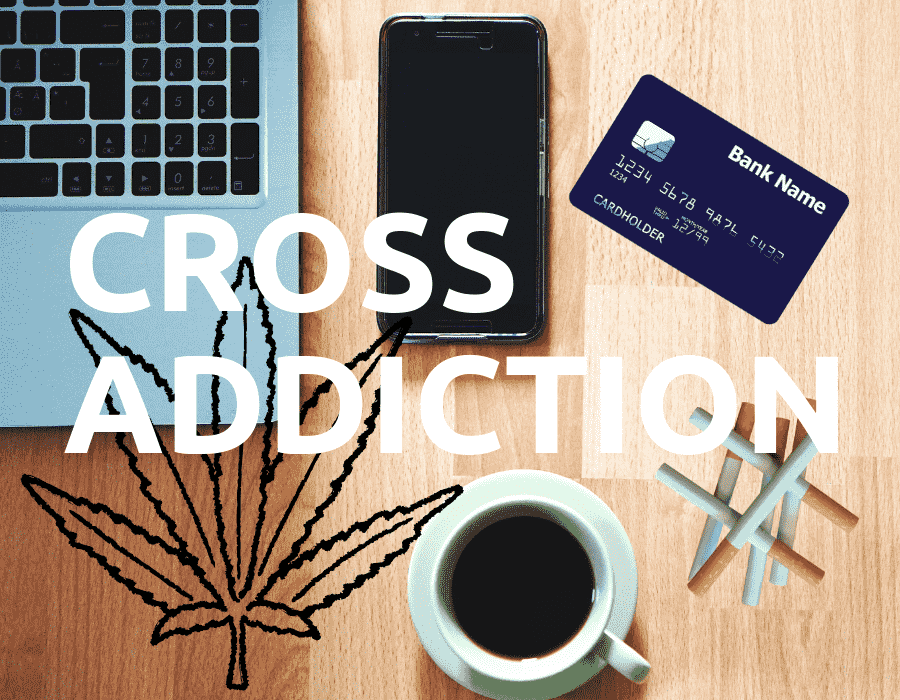After the long, hard, incredibly rewarding journey of achieving sobriety, it can be tough to realize that there are still parts of us that behave addictively–albeit, not toward our drugs of choice. These lingering addictive behaviors usually occur around things that are highly rewarding and cause a dopamine surge in the brain. These remaining addictive behaviors that may exist for us in sobriety are known as cross-addictions. Most cross-addictions are at least slightly more benign than addiction to drugs and alcohol, and are not nearly as fatal or life-ruining, but can still cause serious harm in our lives and affect our emotional and physical health. Cross-addictions should be respected, examined, and addressed mindfully in order for us to progress in our emotional and physical sobriety.
Some common cross-addictions that people in recovery deal with include exercise, sex, nicotine, caffeine, food (especially sugar), shopping, work, and love/romance. At a glance, it should be clear that all of these behaviors or substances can be quite rewarding and enjoyable; in fact, things like exercise, meaningful work, and love are all part of the best things in life. But, like anything, when taken to extremes and when used as an emotional crutch to block out emotional pain, these behaviors can become very detrimental and even lead us back to a chemical relapse!
Some of the signs that a pleasant activity has become a true cross-addiction include compulsively behaving in the activity (eating a ton of cookies even when you’re not hungry), developing tolerance (needing to run further and faster in order to achieve the same “runner’s high”), and continuation of the behavior despite evidence that it is negatively affecting your life (continuing to spend money on credit cards even though you can’t make the minimum payments and are stressed about debt).
One of the most salient dangers of cross-addictions is that they may allow us to temporarily let up on our main recovery goals, like attaining a peaceful, joyful life of serenity and acceptance, and coming to a place of meaning and connection in our lives where getting high isn’t necessary anymore. Perhaps the compulsively exercising will give us the dopamine and endorphins that we need to mask our pain for awhile, but there will a come a time either where tolerance will develop or where a very serious emotional disturbance will occur in our lives that running (or smoking, or eating, or sex) simply can’t compensate for, and we will be left defenseless. In such a dire situation, we may very well turn to chemical substances again because we have lost our emotional, spiritual, and social coping skills.
Some cross-addictions seem to be more dangerous than others. Exercise, for instance, has been proven to be extremely beneficial to people in recovery and, for the most part, consistent and even quite strenuous exercise, such as training for a marathon, can be very good. Others, like smoking, may seem innocuous but have obvious long-term health benefits and can affect how others see us or treat us (a lot of people don’t like to be around smokers!). Love and sex are important parts of life but when toxic relationships, acting out sexually, or codependency come into play, they can be some of the biggest drivers for relapse.
There are many effective ways to deal with cross-addictions and to continue to grow as a person. For one, some sort of 12-step program exists for almost any addictive behavior, including overeating, love and sex, and spending money. The 12-steps are similar in most programs and can really work to bring us freedom and peace. Working with a therapist is also highly recommended; therapists see many clients who are dealing with compulsive behaviors. Sometimes, such as with smoking, a doctor may be able to prescribe a medicine to reduce cravings or fix neurochemical imbalances that we are self-medicating with nicotine. Social connection with others struggling with the same issue is paramount–we feel less alone and can support each other and give each other advice.
Working to overcome cross-addictions can be difficult! And don’t beat yourself up if you’re dealing with some of these–it’s normal and we shouldn’t lose sight of the big picture that we have overcome the deadly substances of abuse that we had lost ourselves in. Sometimes the hardest thing for recovering addicts to practice is moderation. But use your journey through cross-addictions to explore your own mind and spirit, to get to know yourself better, and to continue to reach out to others!

